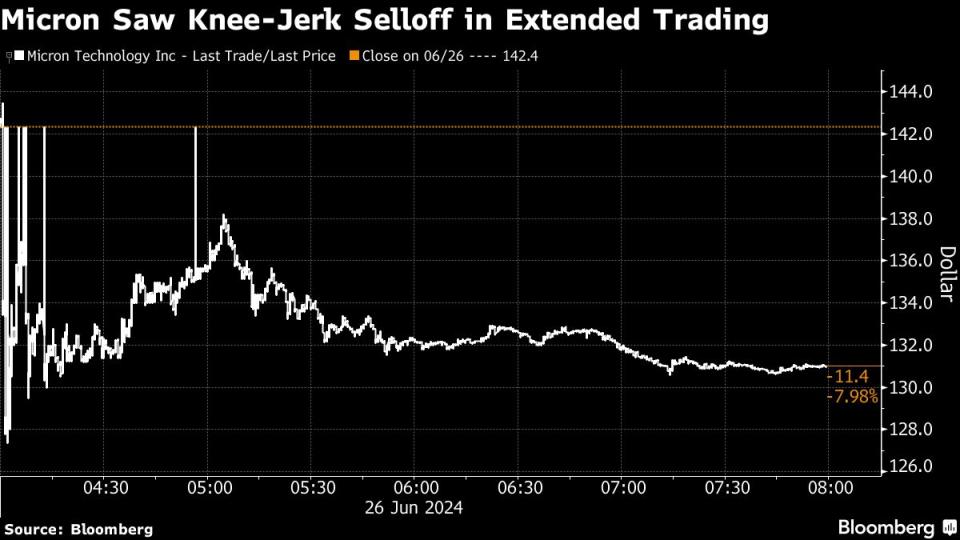Micron’s selloff highlights risk of sky-high AI expectations
(Bloomberg) — Micron Technology Inc.’s (MU) post-results selloff sent a fresh reminder to global investors about the risks inherent in bets on artificial intelligence chipmakers.
Most Read from Bloomberg
YouTuber Dr Disrespect Was Allegedly Kicked Off Twitch for Messaging Minor
Bolivia’s President Arce Swears in New Army Chief After Coup Bid
SpaceX Tender Offer Said to Value Company at Record $210 Billion
Days after leading AI chipmaker Nvidia Corp. (NVDA) slumped by nearly half a trillion dollars, Micron shares fell about 8% in extended trading after the memory maker offered a forecast that fell short of the highest estimates.

In a sign of the extreme volatility in AI-related stocks, Micron’s news also triggered drops in South Korea’s two biggest companies, Samsung Electronics Co. (005930.KS)and SK Hynix Inc. (000660.KS), as fellow memory chip providers feeding the AI supply chain.
Micron is one of the many companies that have gotten a lift from the mania for AI-related stocks, as its high-bandwidth memory is a candidate for use alongside Nvidia’s industry-leading chips for training large language models. Its shares had more than doubled in the year prior to its Wednesday report, but — even with an outlook roughly in line with the average of analyst estimates — the company was punished for not outperforming elevated expectations.
“The market is holding totally unrealistic expectations, as many names who are beating street estimates by a wide margin are still being sold down,” said Andrew Jackson, head of Japan equity strategy at Ortus Advisors Pte in Singapore. “But I think the street is very well aware of the fact that these US names are pretty overcooked. Too many paper hands chasing the fast easy money.”
Momentum in the global AI frenzy took a hit earlier this week when Nvidia shares entered correction territory on Monday before bouncing back. A global gauge tracking semiconductor shares fell about 5% since reaching an all-time high earlier this month.
For businesses like Micron, whose traditional output of supplying memory for PCs, smartphones and more conventional data center use is still recovering from a slump last year, that means a great degree of share price uncertainty.
The US memory maker’s briefing fell short of what SK Hynix offered earlier, when it announced that its HBM production capacity is largely sold out through 2025, said Tom Kang, director at Counterpoint Research. Micron lacks the dominant position in AI memory that SK Hynix enjoys or in the broader memory industry that Samsung has, he added.
“This brings a reality check to the AI sector, which looks bubblish,” Kang said.
The relentless rally in US megacaps that are seen as benefiting from AI has pushed their shares to historically high valuations. Micron shares are priced at 4.5 times sales projected over the next 12 months, compared with an average of 2.2 times over the past 10 years.
—With assistance from Abhishek Vishnoi.
Most Read from Bloomberg Businessweek
The FBI’s Star Cooperator May Have Been Running New Scams All Along
How Jeff Yass Became One of the Most Influential Billionaires in the 2024 Election
How Glossier Turned a Viral Moment for ‘You’ Perfume Into a Lasting Business
©2024 Bloomberg L.P.

 Yahoo Finance
Yahoo Finance 